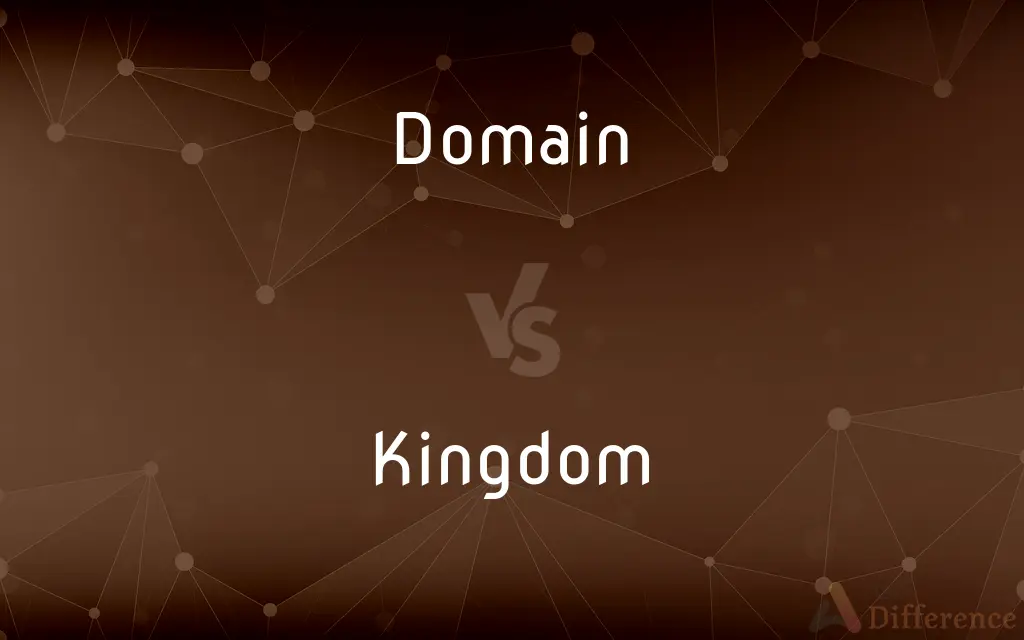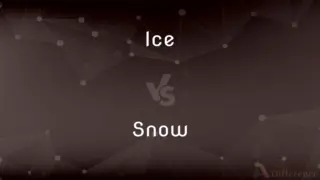Domain vs. Kingdom — What's the Difference?
By Fiza Rafique & Urooj Arif — Updated on April 15, 2024
Domain is a higher taxonomic rank above kingdom, comprising three groups—Archaea, Bacteria, and Eukarya—while kingdoms are subsets within these domains, such as Animalia and Plantae.

Difference Between Domain and Kingdom
Table of Contents
ADVERTISEMENT
Key Differences
Domains encompass the broadest classifications of life forms on Earth, splitting all organisms into three categories: Archaea, Bacteria, and Eukarya. Whereas kingdoms are one level below domains, classifying organisms within these domains into groups like Fungi, Plantae, and Animalia based on more specific shared characteristics.
Archaea and Bacteria are domains composed entirely of unicellular organisms that have distinct biochemistry and genetics from each other. On the other hand, the domain Eukarya includes kingdoms like Plantae, Animalia, and Fungi, which are characterized by having cells with a nucleus and other organelles.
The concept of domains was introduced in 1977 by Carl Woese, based on differences in ribosomal RNA sequences, establishing a new taxonomic level above the kingdom. In contrast, the concept of kingdoms has been a long-standing part of biological taxonomy, traditionally starting with two kingdoms and expanding as knowledge of the diversity of life has increased.
In the three-domain system, Eukarya is unique for its complex cellular structure and organisms that can be multicellular. Meanwhile, all organisms in both the Archaea and Bacteria domains are prokaryotic, meaning they lack a nucleus and are generally unicellular.
Domains offer a more macroscopic perspective on the tree of life, aiding in understanding evolutionary distances and fundamental genetic relationships. Kingdoms, however, provide more detailed insights into physiology, structure, and ecology within these broader groups.
ADVERTISEMENT
Comparison Chart
Taxonomic Rank
Highest taxonomic classification
Second highest taxonomic classification
Number of Categories
Three (Archaea, Bacteria, Eukarya)
Multiple (e.g., Plantae, Animalia, Fungi)
Cellular Organization
Prokaryotic (Archaea, Bacteria) or Eukaryotic (Eukarya)
Mostly Eukaryotic (except Monera)
Level of Complexity
Generally broader and less specific
More specific and detailed
Historical Development
Introduced by Carl Woese in 1977
Long-standing part of biological taxonomy
Compare with Definitions
Domain
A primary classification in taxonomy, higher than kingdom, grouping all life forms into three categories.
The domain Eukarya includes all organisms with eukaryotic cells.
Kingdom
Used extensively in both educational and scientific contexts.
Biology courses typically begin with an explanation of kingdoms in taxonomy.
Domain
Divides life forms based on cellular organization and genetic makeup.
The domain Bacteria consists solely of prokaryotic microorganisms.
Kingdom
Historically used to organize species into broad groups.
Kingdoms have evolved from simple two-kingdom systems to more complex classifications.
Domain
Reflects fundamental genetic differences based on ribosomal RNA.
Domains are distinguished by unique sequences in their ribosomal RNA.
Kingdom
Provides a detailed look at the diversity within larger taxonomic categories.
Studying kingdoms reveals detailed traits that distinguish different species.
Domain
Focuses on the most extensive divisions in the classification of life.
Studying domains is crucial for grasping the scope of biological diversity.
Kingdom
Reflects ecological roles, organism structures, and reproductive methods.
The kingdom Fungi includes organisms that reproduce by spores.
Domain
Aids in understanding the broad evolutionary lines across organisms.
Analyzing domains helps scientists trace the most ancient evolutionary splits.
Kingdom
A category used to classify organisms within a domain based on similar characteristics.
The kingdom Plantae groups all photosynthetic plants.
Domain
An area of territory owned or controlled by a particular ruler or government
The French domains of the Plantagenets
Kingdom
A country, state, or territory ruled by a king or queen
The Kingdom of the Netherlands
Domain
A distinct subset of the Internet with addresses sharing a common suffix or under the control of a particular organization or individual.
Kingdom
The spiritual reign or authority of God.
Domain
A discrete region of magnetism in ferromagnetic material.
Kingdom
Each of the three traditional divisions (animal, vegetable, and mineral) in which natural objects have conventionally been classified.
Domain
The set of possible values of the independent variable or variables of a function.
Kingdom
A political or territorial unit ruled by a sovereign.
Domain
A distinct region of a complex molecule or structure.
Kingdom
The eternal spiritual sovereignty of God or Christ.
Domain
A territory over which rule or control is exercised.
Kingdom
The realm of this sovereignty.
Domain
A sphere of activity, influence, or knowledge
The domain of history.
Kingdom
A realm or sphere in which one thing is dominant
The kingdom of the imagination.
Domain
The set of all possible values of an independent variable of a function.
Kingdom
In the Linnean taxonomic system, the highest taxonomic category into which organisms are grouped, based on fundamental similarities and common ancestry. One widely used taxonomic system designates five or six such groups
Animals, plants, fungi, protists, and prokaryotes (often divided into bacteria and archaea). Other systems divide organisms into domains (eukaryotes, bacteria, and archaea) that replace or rank above kingdoms.
Domain
An open connected set that contains at least one point.
Kingdom
One of the three main divisions (animal, vegetable, and mineral) into which natural organisms and objects have traditionally been classified.
Domain
(Computers)A group of networked computers that share a common communications address.
Kingdom
A realm having a king and/or queen as its actual or nominal sovereign.
Domain
(Physics)Any of numerous contiguous regions in a ferromagnetic material in which the direction of spontaneous magnetization is uniform and different from that in neighboring regions.
Kingdom
A realm, region, or conceptual space where something is dominant.
The kingdom of thought
The kingdom of the dead
Domain
(Biology)Any of three primary divisions of organisms, consisting of the eukaryotes, bacteria, and archaea, that rank above a kingdom in taxonomic systems based on similarities of DNA sequences.
Kingdom
(taxonomy) A rank in the classification of organisms, below domain and above phylum; a taxon at that rank (e.g. the plant kingdom, the animal kingdom).
Domain
(Law)The land of one with paramount title and absolute ownership.
Kingdom
The rank, quality, state, or attributes of a king; royal authority; sovereign power; rule; dominion; monarchy.
Thy kingdom is an everlasting kingdom.
When Jehoram was risen up to the kingdom of his father, he strengthened himself.
Domain
A geographic area owned or controlled by a single person or organization.
The king ruled his domain harshly.
Kingdom
The territory or country subject to a king or queen; the dominion of a monarch; the sphere in which one is king or has control.
Unto the kingdom of perpetual night.
You're welcome,Most learned reverend sir, into our kingdom.
Domain
A field or sphere of activity, influence or expertise.
Dealing with complaints isn't really my domain: get in touch with customer services.
His domain is English history.
Kingdom
An extensive scientific division distinguished by leading or ruling characteristics; a principal division; a department; as, the mineral kingdom. In modern biology, the division of life into five kingdoms is widely used for classification.
Domain
A group of related items, topics, or subjects.
Kingdom
A domain in which something is dominant;
The untroubled kingdom of reason
A land of make-believe
The rise of the realm of cotton in the south
Domain
(mathematics) The set of all possible mathematical entities (points) where a given function is defined.
Kingdom
A country with a king as head of state
Domain
The set of input (argument) values for which a function is defined.
Kingdom
The domain ruled by a king or queen
Domain
(mathematics) A ring with no zero divisors; that is, in which no product of nonzero elements is zero.
Integral domain
Kingdom
A monarchy with a king or queen as head of state
Domain
An open and connected set in some topology. For example, the interval (0,1) as a subset of the real numbers.
Kingdom
One of seven biological categories: Monera or Protoctista or Plantae or Fungi or Animalia
Domain
Any DNS domain name, particularly one which has been delegated and has become representative of the delegated domain name and its subdomains.
Kingdom
A basic group of natural objects
Domain
A collection of DNS or DNS-like domain names consisting of a delegated domain name and all its subdomains.
Domain
(computing) A collection of information having to do with a domain, the computers named in the domain, and the network on which the computers named in the domain reside.
Domain
(computing) The collection of computers identified by a domain's domain names.
Domain
(physics) A small region of a magnetic material with a consistent magnetization direction.
Domain
(computing) Such a region used as a data storage element in a bubble memory.
Domain
(data processing) A form of technical metadata that represent the type of a data item, its characteristics, name, and usage.
Domain
(taxonomy) The highest rank in the classification of organisms, above kingdom; in the three-domain system, one of the taxa Bacteria, Archaea, or Eukaryota.
Domain
(biochemistry) A folded section of a protein molecule that has a discrete function; the equivalent section of a chromosome
Domain
Dominion; empire; authority.
Domain
The territory over which dominion or authority is exerted; the possessions of a sovereign or commonwealth, or the like. Also used figuratively.
The domain of authentic history.
The domain over which the poetic spirit ranges.
Domain
Landed property; estate; especially, the land about the mansion house of a lord, and in his immediate occupancy; demesne.
Domain
Ownership of land; an estate or patrimony which one has in his own right; absolute proprietorship; paramount or sovereign ownership.
Domain
The set of values which the independent variable of a function may take. Contrasted to range, which is the set of values taken by the dependent variable.
Domain
A connected set of points, also called a region.
Domain
A region within a ferromagnetic material, composed of a number of atoms whose magnetic poles are pointed in the same direction, and which may move together in a coordinated manner when disturbed, as by heating. The direction of polarity of adjacent domains may be different, but may be aligned by a strong external magnetic field.
Domain
An address within the internet computer network, which may be a single computer, a network of computers, or one of a number of accounts on a multiuser computer. The domain specifies the location (host computer) to which communications on the internet are directed. Each domain has a corresponding 32-bit number usually represented by four numbers separated by periods, as 128.32.282.56. Each domain may also have an alphabetical name, usually composed of a name plus an extension separated by a period, as worldsoul.org; the alphabetical name is referred to as a domain name.
Domain
The three-dimensional structure within an immunoglobulin which is formed by one of the homology regions of a heavy or light chain.
Domain
The field of knowledge, expertise, or interest of a person; as, he had a limited domain of discourse; I can't comment on that, it's outside my domain.
Domain
A particular environment or walk of life.
Domain
People in general; especially a distinctive group of people with some shared interest.
Domain
A particular environment or walk of life;
His social sphere is limited
It was a closed area of employment
He's out of my orbit
Domain
Territory over which rule or control is exercised;
His domain extended into Europe
He made it the law of the land
Domain
The set of values of the independent variable for which a function is defined
Domain
People in general; especially a distinctive group of people with some shared interest;
The Western world
Domain
A knowledge domain that you are interested in or are communicating about;
It was a limited domain of discourse
Here we enter the region of opinion
The realm of the occult
Common Curiosities
What criteria are used to define a domain in taxonomy?
Domains are defined based on fundamental genetic composition and cellular organization, particularly differences in ribosomal RNA sequences and cell structure.
What are the main characteristics that differentiate the domains Archaea and Bacteria?
Archaea and Bacteria are both prokaryotic, but they differ significantly in their genetic makeup and cellular processes.
What are the three domains of life?
The three domains of life are Archaea, Bacteria, and Eukarya.
Can you name some kingdoms under the domain Eukarya?
Some kingdoms under the domain Eukarya include Plantae, Animalia, and Fungi.
What role does cellular complexity play in the distinction between domains and kingdoms?
Cellular complexity is crucial, with domains categorized by the presence of prokaryotic or eukaryotic cells, while kingdoms are further defined by specific organismal characteristics like multicellularity and modes of nutrition.
How did the introduction of domains alter the traditional view of kingdoms in taxonomy?
The introduction of domains provided a higher-level perspective that highlighted the deep evolutionary divergences between major groups of organisms, leading to a reevaluation of relationships within traditional kingdoms.
Are viruses included in the domain classification system?
No, viruses are not included in the domain classification system as they are not considered living organisms due to their lack of cellular structure and reliance on host cells for replication.
What are some examples of organisms in the domain Archaea?
Examples include extremophiles, like thermophiles and halophiles, which thrive in extreme environments such as hot springs and salt lakes.
How do scientific advancements impact the classification of domains and kingdoms?
Scientific advancements, particularly in genetics and molecular biology, continue to refine and sometimes redefine the classifications within domains and kingdoms as new information becomes available.
What are the ecological implications of differentiating organisms into domains and kingdoms?
Classifying organisms into domains and kingdoms helps in understanding ecological roles, interactions, and evolutionary relationships, which are essential for studying biodiversity and ecosystem dynamics.
Can an organism ever be reclassified from one kingdom to another?
Yes, organisms can be reclassified between kingdoms as new genetic, biochemical, or ecological data becomes available, highlighting the dynamic nature of taxonomy.
How does the classification into domains and kingdoms aid in biological research and education?
This classification system aids in organizing biological diversity into a comprehensible framework, facilitating research by providing a structured way to study evolutionary relationships and educating students on the broad outlines of life's diversity.
How is a domain different from a kingdom in biological taxonomy?
A domain is a broader category than a kingdom, encompassing several kingdoms within it based on more fundamental genetic and biochemical characteristics.
What is the significance of the domain Eukarya having both unicellular and multicellular organisms?
It highlights the evolutionary complexity and diversity within Eukarya, encompassing simple single-celled organisms as well as complex multicellular organisms, which indicates significant evolutionary developments within this domain.
Share Your Discovery

Previous Comparison
Ice vs. Snow
Next Comparison
Commander vs. GeneralAuthor Spotlight
Written by
Fiza RafiqueFiza Rafique is a skilled content writer at AskDifference.com, where she meticulously refines and enhances written pieces. Drawing from her vast editorial expertise, Fiza ensures clarity, accuracy, and precision in every article. Passionate about language, she continually seeks to elevate the quality of content for readers worldwide.
Co-written by
Urooj ArifUrooj is a skilled content writer at Ask Difference, known for her exceptional ability to simplify complex topics into engaging and informative content. With a passion for research and a flair for clear, concise writing, she consistently delivers articles that resonate with our diverse audience.














































